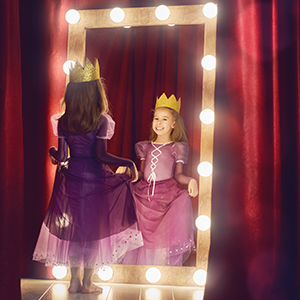There is a reason theatrical productions are referred to as “plays.”
Surely, it is because in addition to being hard work, theater can also be a
great form of play. Even one small moment in the limelight can serve to
permanently fire the imagination and creative spirit of a child.
Although many kids prefer to spend their time in organized sports, there
are many others who have never been able to grab onto sports as a pastime
that they can enjoy and at which they can excel. If your child doesn’t “get
into” sports, you may want to consider introducing him or her to another
form of play: theater.
We all remember playing dress-up as children. We recall how much fun it was
to pretend to be a princess, a cowboy or an alien from outer space.
Participating in organized theater activities captures this playful
element. What’s more, with every successive performance, our children are
not only “playing,” but they are perfecting a craft that may lead to a
lifetime of enjoyment. Just as sports can teach kids how to follow
directions, how to work as a “team” and how to perfect a skill set, so can
drama. Even more importantly, when a child receives the cheers and applause
of an audience, it is every bit as satisfying as the cheers of spectators
at a ballgame.
According to James Catterall, UCLA Professor, participation in drama aids
in educational and social success. His book, “Doing Well and Doing Good by
Doing Art: The Effects of Education in the Visual and Performing Arts on
the Achievements and Values of Young Adults,” shares the results of studies
that trace how involvement in performing and visual art influences
children. He says in the book: “Our analyses found substantial and
significant differences in achievement and in important attitudes and
behaviors between youth highly involved in the arts and those with little
or no arts engagement.” His study, which was a focal point of the book,
showed that kids involved in theater, band, orchestra, chorus, dance and
other artistic pursuits had higher school achievement, lower rates of
dropping out of school and “better attitudes about school and community.”
If this is true, then theater is definitely play with a purpose!
Theater is a yearround activity that can involve the entire family, from
the oldest member to the very youngest. Many theaters and playhouses
provide opportunities for youngsters to get involved. For those who are
outgoing, taking a role onstage may be a possibility. When starting out, a
child with little experience will need to begin with roles as an “extra” in
the ensemble, or with small bit parts until he or she builds up enough
maturity and acting chops to carry a more serious role. But with time, your
child could develop dramatic skills that will delight audiences.
Perhaps your child is shy about being in the spotlight and would prefer to
help behind the scenes by getting stage sets and props ready, helping with
costumes or assisting those who work in sound and lights. There is an
option for every personality and age. Community theater is a great activity
for families, as it is something they can enjoy together for many years.
Many children begin their involvement in plays by enrolling in a summer or
afterschool camp. Others choose to participate, beginning at the
middle-school level, in drama classes or musical productions staged at
school. By participating in school plays and theater camps, your child can
become familiar with the rudiments of a stage show; this can help him or
her transition more easily to getting involved with community theater.
Pick up the phone and call a local theater and ask about how you can become
involved. Just as “soccer moms” love to see their kids kick an impossible
goal, you will enjoy seeing your “superstar” on a stage, delivering a line
perfectly or posing as the perfect princess, clown, superhero or dainty
yellow flower.



